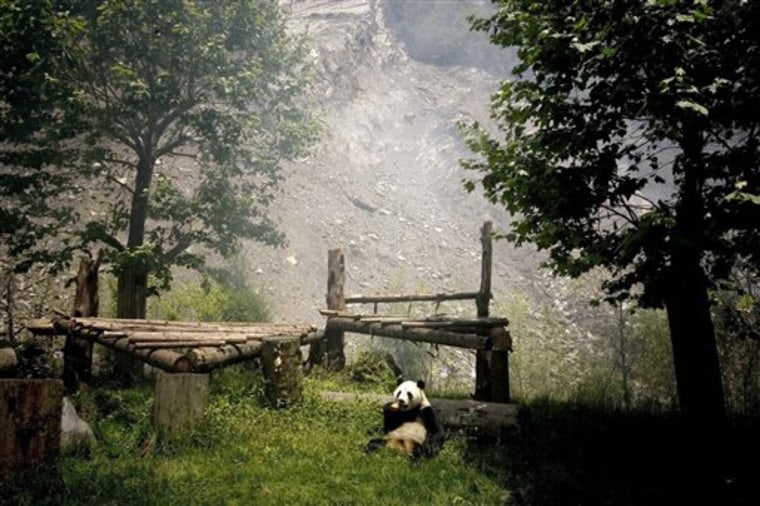About 35 pandas at a reserve in southwestern China face an uncertain future after nearly a quarter of their habitat was destroyed by last year's powerful earthquake that killed nearly 70,000 people, according to a study published Monday.
Large parts of Sichuan province — where most of the world's remaining wild pandas live — were devastated by the massive May 12 earthquake, which sent landslides crashing into river valleys and leaving 5 million homeless.
The landslides and mudflows destroyed 23 percent of the panda's habitat in the south Min mountain region and the remaining bamboo-rich land was left fragmented, potentially threatening the pandas' way of life, said Xu Weihua, the study's lead author and an ecologist with the Chinese Academy of Sciences in Beijing.
"The Min mountains were the hardest-hit habitat during the earthquake and the isolation of the pandas into small groups caused by land fragmentation spells trouble for its inhabitants," said Xu, whose article written with six other researchers was published in the ecology journal, Frontiers in Ecology and the Environment.
"Such isolation could lead to the risk of their extinction caused by inbreeding," he told The Associated Press.
The last count of pandas in the area in 2001 found just 35 of them.
The study called for more conservation in the remaining habitat areas and the creation of corridors that would link the fragmented areas and allow the pandas to interact more.
The 2,352 square-mile south Min mountain region, where the edge of the Chengdu basin meets the edge of the Tibetan plateau, is home to four nature reserves.
Researchers do not know how the pandas mentioned in the study are coping with the recent changes in their environment, said Lu Zhi, a panda expert and director of the Center for Nature and Society at Peking University.
"We know that the Min mountains were one of the hardest-hit panda habitats during the earthquake, but we really have no idea how these pandas reacted to the earthquake," Lu said in an interview.
"Pandas prefer gentler slopes, so what's left of this steep region is not conducive to their natural preferences and could affect their survival," she said.
Pandas already are threatened by loss of habitat, poaching and a low reproduction rate. Only about 1,600 pandas live in the wild, mostly in Sichuan province. An additional 120 are in Chinese breeding facilities and zoos.
Researchers in Sichuan last week welcomed the first panda born from frozen sperm — an innovation scientists hope will help the endangered species avoid extinction.
The panda breeding center at the Wolong Giant Panda Research Center was also damaged by the earthquake, whose epicenter was just 20 miles away.
